|
Posted by Romy the Cat on
03-15-2007
|
|
The Japanese Christopher Witmer posted at the Sewers some finny pictures of another Klangfilm “invention”. It is hardly could be imagined more bogus design for a two way horn systems – no wonder that people hate horns…
I wonder if one of the reasons why people deservingly hate horn is because no one educate them any sound-relevant truth about horns? The moderating dirt at the Sewers has deleted all posts that question the rational of this Klangfilm horn… (As they do for years vandalizing any context more intelligence they can handle or they can not sell). Perhaps if that self-appointed “moderating dirt” along with a dozen of morons-writers in audios publication would feed people with wrong information then the average audio people would eventually understand something about horn and would realize why this horn sound so poor.
Anyhow, in the vacuum of any civilized intelligence about horns or any creditable framework that would propagate that knowledge let to permit to the “worshipers” to fetish over the bogus designs from 1934….
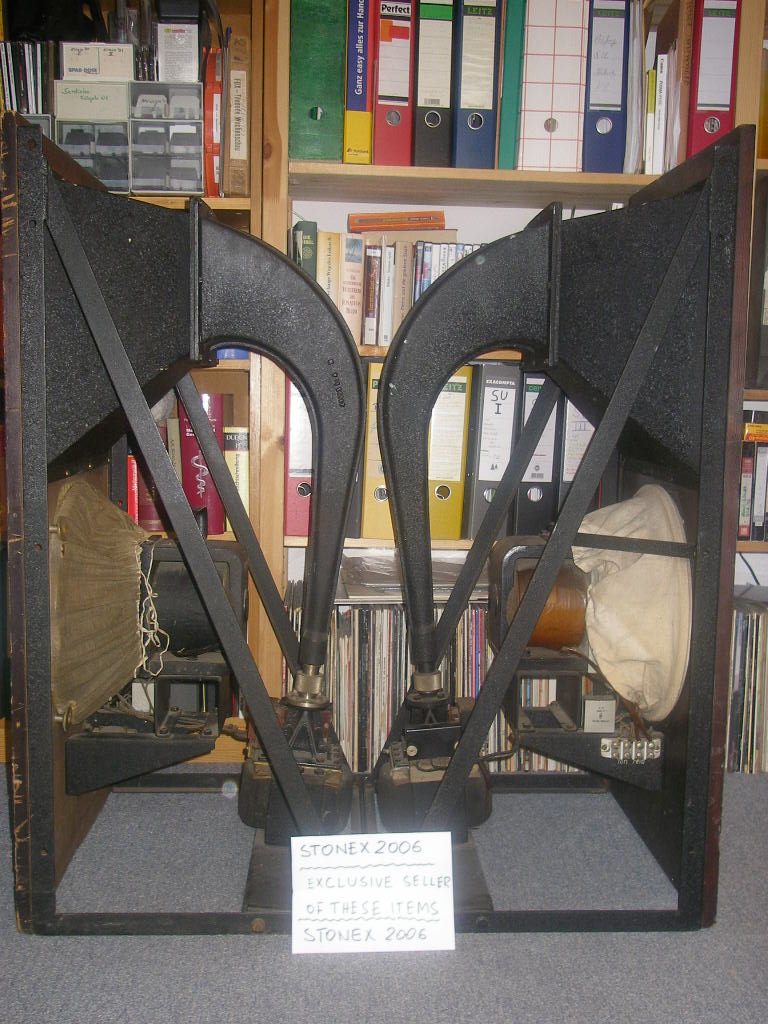
Also, courtesy to Christopher, here is a link of a Japanese guy what who has this mono horn in his room:
http://www.gokudo.co.jp/Vanguard/bekkan/bekkan.htm
Rgs,
Romy the Cat
|
|
|
|
Posted by guy sergeant on
03-15-2007
|
As a piece of 73 year old cinema sound technology, I think they look great. As something to reproduce music on, maybe not. They belong in a museum really.
Which would you rather try to get good sound from Romy? These or Magico Mini's?
|
|
|
|
Posted by Paul S on
03-15-2007
|
Somehow the front runners in the horn field seem to have entered a time warp. At least we tried mightily to overcome/mitigate "horn sound", back in the day.
With all the promise horns offer in terms of dynamics, all I wanted was a decent demonstration that horns could get it done without the tromboning, "horn sound", phase anomilies and combing.
It has long seemed to me that the 2 main horn groups were antiquarians and those who either forgave or ignored horns' shortcomings because of their strengths., just like the "Lowther Guys", the "Planar Guys", the "SET Guys", etc, etc.
To brook examples like these it must be that these very committed folks are either after a very particular thing these speakers do well, or they are just after these speakers.
Best regards,
Paul S
|
|
|
|
Posted by Gregm on
03-16-2007
|
There is a picture of a bbq thingy -- at first sight I was confused thinking it was downward & upward facing horns...
 Romy the Cat wrote: Romy the Cat wrote: | |
The Japanese Christopher Witmer posted at the Sewers some finny pictures of another Klangfilm “invention”. It is hardly could be imagined more bogus design for a two way horn systems – no wonder that people hate horns…
I wonder if one of the reasons why people deservingly hate horn is because no one educate them any sound-relevant truth about horns? |
|
No doubt.
But how would one educate -- better still, with what? I mean s/thing that's somewhat available...
Acapella? Avant Garde? A church bell loaded with a Lowther or a Beyma?
|
|
|
|
Posted by Romy the Cat on
03-16-2007
|
 guy sergeant wrote: guy sergeant wrote: | | Which would you rather try to get good sound from Romy? These or Magico Mini's? |
|
I realy do not understated the essence of this comment. If it is a good sound then what the hell different if it came form 73-year old speakers or form Magico Mini? The very same is with the poor sound: if it is sound like shit then what is the difference if it was Klangfilm of Magico?
Any loudspeaker sound bad because the specific mistake. A loudspeaker might sound good without know for a given party reason but it never sound bad without the poor sound to be a direct consequence of the very specific errors that were made. In case of the Magico and case of the given Klangfilm those “errors” exist. Sure, they are different errors. Also, no one said that a loudspeaker must sound good and to be free from “terminal errors” (in context of own topology). However, the point I was trying to make is that those Klangfilms, regardless of the primitive sound and regardless of “unnecessary errors” have a stupid fetish among audio people and I really do not like it. (Magico has own stupid fetish but it comes from other direction that is not the subject of the thead)
BTW, if some one would like to point out where from your point of view ate troubles in THIS Klangfilm system then feel free to share it. Rgs,
Romy
|
|
|
|
Posted by Romy the Cat on
06-07-2010
|
|
fiogf49gjkf0d
In the linked thread “Munich High End 2010..” while taking with Joe the Archeologist I was mentioning the fundamental flows of open baffles. Still, the presence of disadvantages circumstance is not a red flag for somebody actively or my interest. Here a case to point.
A friend of mine (in fact two of them) has Klangfilm Bionor. I “mint” and original and he very much worships it’s “originality”. I do not like this speaker become many reasons but they have some “moments” worth to capitalize upon. Her is a guy, presumably a Chinese guy, who make an attempt to take Bionor a bit further then Klangfilm Bionor originally was intended to. Let analyze what he was trying to do.
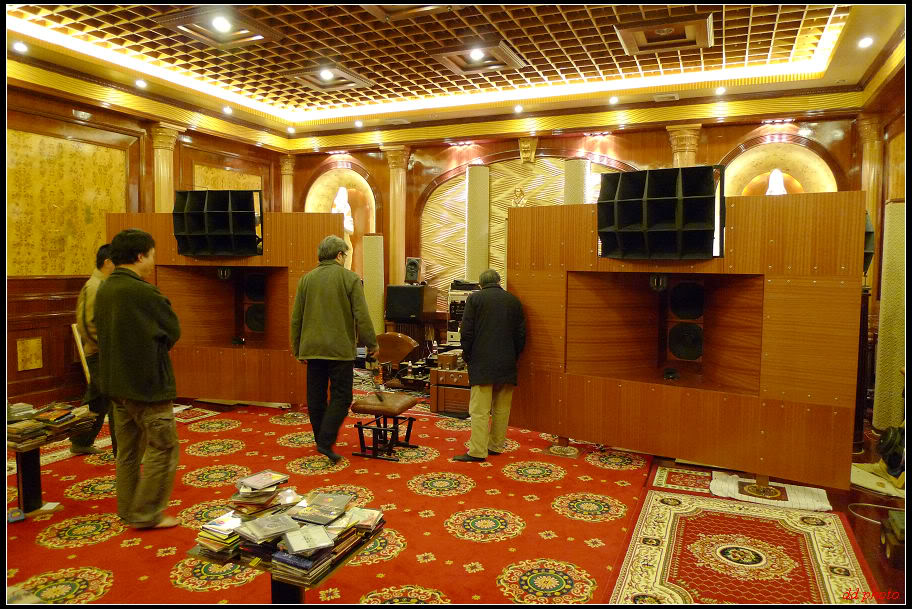
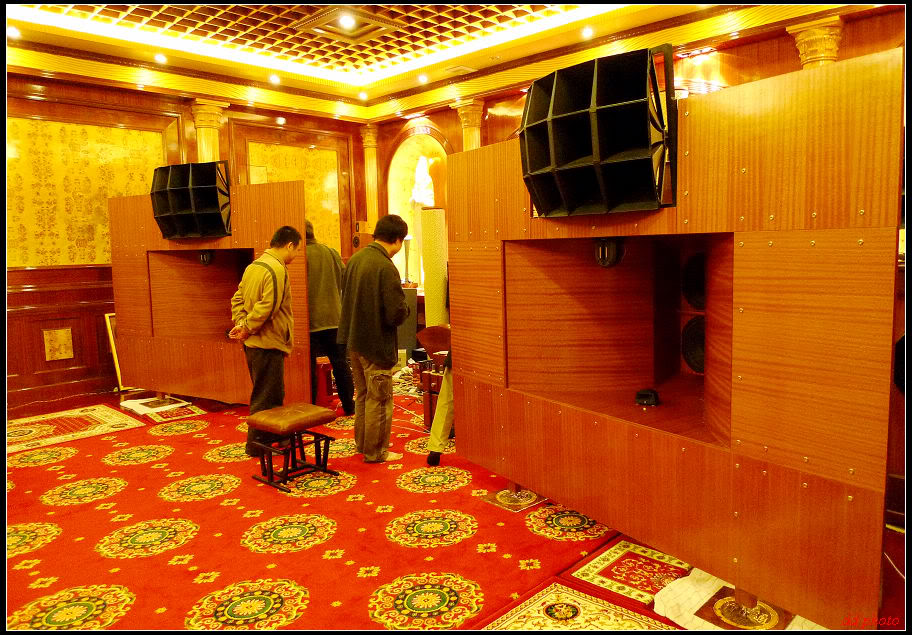
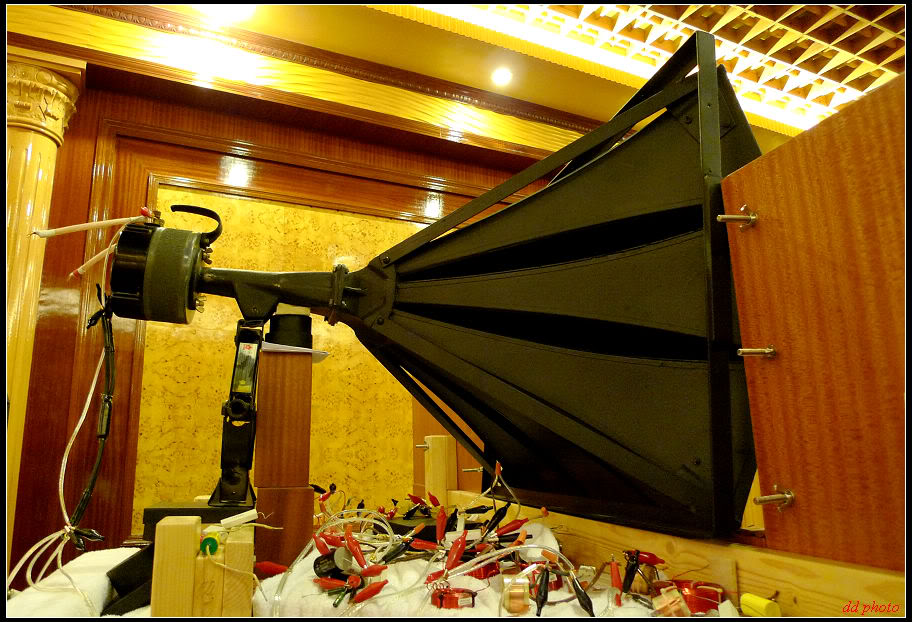
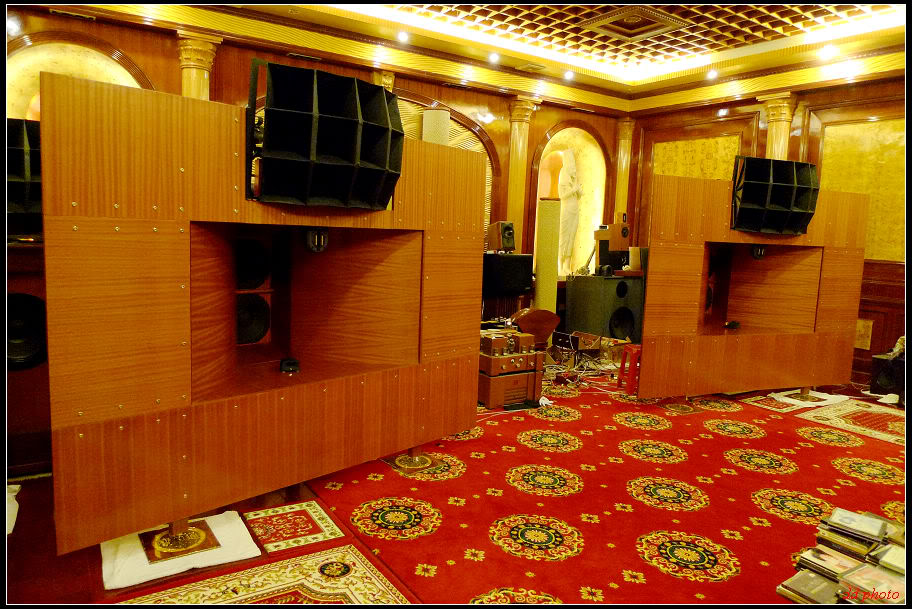
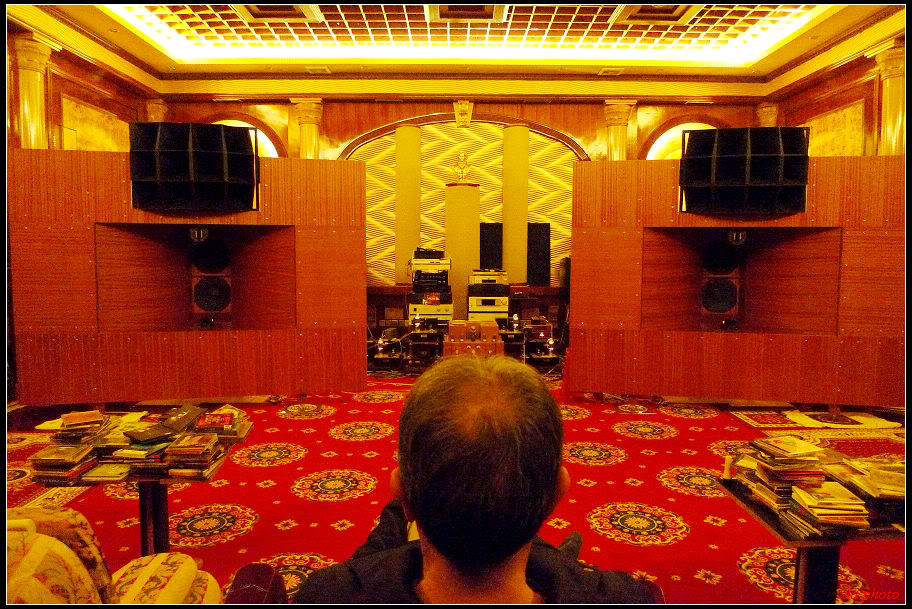
The speakers I hope use the Bionor’s standard pair of 14-inch woofers, most likely KL L405 - very good woofers. The Klangfilm own MF horn got trashed and the 12 section multi-sell was introduced. It is driven by look like WE or early Altec electromagnet compression driver. The MF horn looks like 150-180Hz exponential. I presume that MF driver runs down to 250-300Hz. This is a huge step over the Klangfilm original design where MF was shooting into a horn with much higher cut off. The there is some kind of tweeter, I presume the slot type JBL, or the similar. Due to depression they mount it on the front baffle. Interning that it is not flat with front baffle but a bit indented. I wonder why it would be so. I presume that since the tweeter is not time not alighted whoever did it were trying to set the tweeter a few periods ahead but still in-phase, at least this would be what I would do. There is a strange looks like another tweeter at the bottom of the bass horn. I do not know what it does and if it is a tweeter then I would not do it.
I kind of like what this Klangfilm was trying to do, if somebody know the speaker owner then invite him to describe what he was doing. What this speaker doe is in my view the sanest approach to the Klangfilm Bionor without drooling the vintage saliva and without diving in idiotic hysteria about the advantage of vintage audio. Romy the Cat
|
|
|
|
Posted by msaudio on
06-07-2010
|
|
fiogf49gjkf0d This is not a klangfilm MF Driver, it is a RCA MF Alnico driver with phenolic diaghragm and bakelite rear cover. I have seen a few of these and they sound pretty good for a driver that is good from 300hz to 8000Hz. Sounds alot like a altec 290 driver with a phenolic diaghragm also. Preaching Horn Religion MSAUDIO
|
|
|
|
Posted by Romy the Cat on
06-08-2010
|
|
fiogf49gjkf0d
 Romy the Cat wrote: Romy the Cat wrote: | | I do use some vintage elements in my playback but I use them purposefully. I recognize their strengths and weaknesses and I capitalize on the strengths only. I think this is the only sane approach I see; when some vintage uniqueness of my choosing serves the purposes that I dedicate it to serve. |
|
I would like to expend a bit on the subject of the above shown Klangfilm. What this Klangfilm owner did was what exactly complies with my vision of a prudent audio. The owner recognized in the Klangfilm sound what he line and do not like and by the virtue of own design he indicated what he was trying to accomplish. What is interesting is that when you see the efforts like this, targeted to the right direction, then to predict the result is very difficult because you know that somebody purposely worked with Sound and did not treated Sound “as is”. In many cases I made judgment about sound with any needs to listed a speakers and the judgment in most case is surprisingly more accurate that an opinion of somebody who own the speaker for years. However, in the case of the efforts like the above shown Klangfilm I would not dare to predict how it might sound. Sure, it will have the dipole lower bass, something the I never liked, but it is about all the I can say.
The “msaudio” above was questioning if the speaker is Klangfilm attempt as the MF driver does not look like Klangfilm. The MF driver is in fact a special homosexual version of Klangfilm, the “msaudio” won’t hear or understand the driver anyhow as it would be too emotional for him. There is however a deeper educational layer in it. The final acoustic system shall not comply with Klangfilm label or with anything else. I can see people like Joe Robbers who would sit behind the panel of the speaker and polish the s bolts that join the baffle, claiming that the bolts were make from melted WE tube sockets. Joe Robbers is very much not alone: there are many people in audio for whom enslavement to “vintage obsession” has became a dominating force of sensibility and judgment. What that Klangfilm owner demonstrated is a radical departure from the Vintagtism ™.
I have to note however that “msaudio” might have a point: the Klangfilm MF driver might be more interesting then the X driver (I do not know what it is) that was used. But again, thanks for Klangfilm “collectors” we do not have knowledge about the quality of Klangfilm MF drivers. I need to point out that this is very seldom moment for me what I use phases “we” instead of the phases “I”. I never do but in this case I find it appropriate. The point that I try to make is that “we” and “I” do not have a lot of knowledge how the Klangfilm MF drivers sound. I did listen the Klangfilm MF drivers, both perm magnet and electromagnet, I even took the perm magnet Klangfilm MF driver apart and was studying how it was made. However, it was all in context of inferior in my view original Klangfilm installations – something that would do audio archeologists Joe Robbers to lose his mind and made me to make ugly faces. The point is that I did not hear and did not even see a lot of custom, tailored efforts (like above) to make interesting sound using the Klangfilm elements. It is very possible that the author of the above speaker went for his alternative to Klangfilm MF driver intentionally and if so then I would not care if the MF driver was there “original”.
So, the speaker above might not be the “Klangfilm”. The baffle itself not the original Klangfilm, which is perfectly fine as it is properly made with perpendicular siding and I hope doe not resonate as much at 60-40Hz as the original Klangfilm baffle. Rgs, Romy the Cat
|
|
|
|
Posted by Markus on
06-08-2010
|
|
fiogf49gjkf0d  Romy the Cat wrote: Romy the Cat wrote: | | There is a strange looks like another tweeter at the bottom of the bass horn. |
|
I can't really make it out on the photo, but it looks a bit like a Tannoy Supertweeter.
|
|
|
|
Posted by Romy the Cat on
06-08-2010
|
|
fiogf49gjkf0d  Markus wrote: Markus wrote: | | I can't really make it out on the photo, but it looks a bit like a Tannoy Supertweeter. |
|
Yes, it is but my interest is not what kind of brand he used but why he would need an additional tweeter in the first place? The multi-sell MF channel would probably go up to the 5-8kHz. (I would not run it high then 3-5kHz) If so then the JBL slot tweeter (let call it JBL at least) is kicking in let say 8kHz – it is an OK location for HF driver, even I would prefer higher.
Now is the question – why the owner used an additional tweeter if he positioned it as he did. If it were a regulars let say Tannoy Supertweeter at 13kHz then he would put it in phase with JBL tweeter. The location where the Supertweeter located shale time alignment curve and it will be fine if a person would sit 3 feet from the speaker. I highly doubt that anybody would sit closer then 15-120 feet from them – so it would not be a case. It is not to mention that if the owner have a complete discard to time alignment then he would put the Supertweeter in the very end of the horn and do not expose the Supertweeter to the ugly horizontal surface of bass horn. So, if this is a Supertweeter then I do not know then why it is positioned where it is. I would not be surprised if it turns out to be that it is disconnected. It might be the “former” tweeter or the tweeter that owner mounted and used and then when he went with JBL he does not want to remove “Tannoy Supertweeter” as it is already nicely mounted. I would understand THAT.
The Cat
|
|
|
|
Posted by ayebee on
06-08-2010
|
|
fiogf49gjkf0d An observation that might only be of superficial interest to the thread: I don't think the speakers use Klangfilm woofers. The pictures are a bit grainy, but the dustcaps look far too big for the original Bionor woofers. I would guess this is a "clone" made from the original drawings, but containing no real Klangfilm-components whatsoever... Just my 2c.
/Anders
|
|
|
|
Posted by Romy the Cat on
06-08-2010
|
|
fiogf49gjkf0d  ayebee wrote: ayebee wrote: | | An observation that might only be of superficial interest to the thread: I don't think the speakers use Klangfilm woofers. The pictures are a bit grainy, but the dustcaps look far too big for the original Bionor woofers. I would guess this is a "clone" made from the original drawings, but containing no real Klangfilm-components whatsoever... Just my 2c. |
|
Anders, it is possible that it has no real Klangfilm-components whatsoever... I do not know. The Klangfilm 14” woofer are very nice and the MF drivers were nice if to find a good use for them. It is obvious that the system owner was trying use the bid Klangfilm as an inspiration the profile of the LF horn/baffle is the pure Klangfilm’s. What I find is very admirable that the person did not blindly ripped the Klangfilm design but recognized what he did not like and improved upon it. Ironically that it is absolutely irrelevant to me if his final result turn out to be better of worse of the Klangfilm’s original result. He might use in a way inferior to Klangfilm Altec or TAD drivers and have way less interesting result then what Klangfilm had. This is not the point. I try do not judge the result but to assess motivations and methods. I think the motivations were good and the methods are in a right direction. The result? Like in anything else when a result is a consequence of targeted efforts need to be observed in person. This is not a cookie-cutter of the shelf Wilson, Tannoy, Klangfilm or Western Electric. This is an author’s statement and it might be anything. To be able to predict something you need to know ether a lot of details or the author himself. At least this is the way how I think…
The caT
|
|
|
|
Posted by msaudio on
06-09-2010
|
|
fiogf49gjkf0d If you look at the picture second from the the top, you will see 2 woofers mounted in front on the baffle, notice a 2 piece horn from the baffle. Klangfilm never had such a horn, they would start at the baffle and curve out. The horn in your picture's starts at the baffle and move's in, the first stage, and move's out the second so to compress the output. This is a bad idea, the better idea would be to mount the drivers on the rear of the baffle with 8 inch opening to get your compresion that way, you would have more space for the right horn curve. Preaching Horn Religion MSAUDIO
|
|
|
|
Posted by Romy the Cat on
06-09-2010
|
|
fiogf49gjkf0d  msaudio wrote: msaudio wrote: | | If you look at the picture second from the the top, you will see 2 woofers mounted in front on the baffle, notice a 2 piece horn from the baffle. Klangfilm never had such a horn, they would start at the baffle and curve out. The horn in your picture's starts at the baffle and move's in, the first stage, and move's out the second so to compress the output. This is a bad idea, the better idea would be to mount the drivers on the rear of the baffle with 8 inch opening to get your compresion that way, you would have more space for the right horn curve. |
|
Yes, you are right – I did not pay attention to it. The “step” that they at the throat and a rough transition to the horn might be questionable. I would not do it – under normal circumstances. It might be a technological defect but it also might be an intentional move.
What they did was an introduction a negative opening toward to driver – or they created a large front chamber. This front chamber will slightly increase the LF output and slightly roll off the top response of the LF drivers – that might be an objective that they had. The front chamber also changes the dynamic of the woofers damping – they might played with this – who know what kind bass drivers the use. The original Klangfilm 405 drivers came with cloth dampers on their back, so the Siemens somehow deal with the woofer damping even in open baffle.
It is hard to speculate what they were trying to do. I think it would not be difference for them: to make smooth transition from drivers to horns or to make a step, particularly the compression in step. It would cost the same amount of carpenter’s money to do it either way. I think they did what they did because ether negligence or intent. I vote for intent as I feel it would be too simple mistake to make.
The Cat
|
|
|
|
Posted by msaudio on
06-09-2010
|
|
fiogf49gjkf0d Looking at the pictures again, I believe the builder's had the woofer's mounted on both stages of this horn at one time for testing, and thought it was better with 2 piece horns. This has got me so i want to do some tests to see what the advanages are or not. It reminds me of the JBL Bi-Radial horns model 2380 for HF, but they used jbl design for LF. Has any one seen anybody use this approach pre 1975 for a front loaded horn enclosure? If you have post pictures. Preaching Horn Religion MSAUDIO
|
|
|
|
Posted by ayebee on
06-09-2010
|
|
fiogf49gjkf0d If you look at the original Bionor drawings (you can find them at klangfilm.free.fr) you see that the "bass" horn is actually made out of two sections, the outer is curved, the inner is conical and expand both horizontally and laterally (more in the lateral), as opposed to the outer section. This gives the perceived "negative expansion", which is quite probably just a photographic illusion. Why Klangfilm chose this approach is beyond me...
Anders
|
|
|
|
Posted by Romy the Cat on
06-09-2010
|
|
fiogf49gjkf0d  ayebee wrote: ayebee wrote: | | If you look at the original Bionor drawings (you can find them at klangfilm.free.fr) you see that the "bass" horn is actually made out of two sections, the outer is curved, the inner is conical and expand both horizontally and laterally (more in the lateral), as opposed to the outer section. This gives the perceived "negative expansion", which is quite probably just a photographic illusion. Why Klangfilm chose this approach is beyond me... |
|
Anders, why Klangfilm chose this approach is a wider and a bit complicated question. Let me try to expend on it.
Inspecting some interesting older, in some cases worthy performing designs, we sometimes come to the very same observation: we recognize something and we have no idea why it was done so. It might be applicable to anything: speakers, amplifiers, tubes, you name it. Here is where we need to be very careful about what comes next. The most moronic people recognize this “other way of doing things”, crate a cult around it, place this “other way of doing things” to virtual altar and pray to this “other way of doing things”. More intelligent people try to rational the “other way of doing things” with some auditable advantages that they might note. There is however another approach that I develop for myself and that I adherent to. My approach is that sometimes the “other way of doing things” 70 years back does have cogent base and sometimes it absolutely does not. It is just a way how it was done and there is absolutely nothing valuable behind it.
I do not really feel that in the end of the 40s when Siemens started produce Bionor they spent even a fraction of efforts to audition them and tested them at the level as we do today? It was made to power room of a few hundred men in movie theaters. The Siemens amps in time were way more restricted and limited – it was no need and no source for too high quality of reproduction. So, the profile of the Bionor throat might come from some kind of reasons or might be just because they did it so and it’s it. If any reasons even existed then I would estimate it as very negligible reason. The diameter of the throat is very large and the little negative curve that they had is absolutely negligible. This horn itself is a bit different then the horn that we are accustom – it does not work as horn but rather as open baffle with a little help in lower MF and upper bass. In the case of this guy above with his large MF horn the Bionor’s bass “horn” will not be running very high and the throat area is even less important.
So, the Klangfilm might not “chose” this approach, the might juts did it and did not care what they do.
The Cat
|
|
|
|
Posted by Horn Savant on
08-19-2010
|
|
fiogf49gjkf0d I think this is the one w/ the ribbon driver . Seems more innovative than contemporary
Western Electric approach. That is the planar driver would not require a phase plug ?
Western Electric's mid 1930's phase plug passes sound thru narrow slits and others
would copy this orthodoxy up till today.
|
|
|
|
Posted by jzagaja on
06-09-2011
|
|
fiogf49gjkf0d Klangfilm KL-51 rebuilt at www.horns.pl
|
|